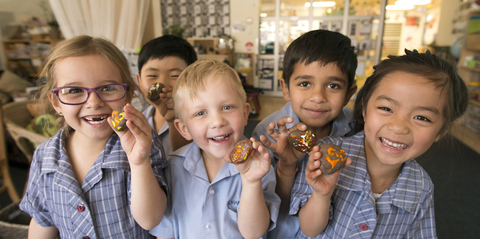
The Wellbeing Coordinator works closely with staff and students to lead a whole school approach to the development of personal responsibility and social and emotional learning, implementing the Smiling Minds School Curriculum across Reception to Year 6. The Wellbeing Coordinator supports students with social and emotional needs analysing Classroom Pulse Check In data and referrals from teachers as well as supporting Restorative Practices to restore relationships across the school.
The School’s Wellbeing Coordinator is responsible for:

The school Counsellor works in partnership with students, teachers and parents/caregivers to enhance students’ social and emotional wellbeing.
The counselling is child-focused and informed by the needs, goals and developmental level of the student. It is a voluntary process that takes place in a one-on-one setting at the school.
The Counsellor is committed to working respectfully and collaboratively with students, parents/caregivers and teachers in ways that build on students’ individual strengths, offering support and information on:
The school Chaplain works in partnership with students, teachers and parents/caregivers to enhance students’ social and emotional wellbeing.
The school Chaplain is responsible for:
Smiling Minds School Curriculum is a research based social and emotional learning program to build essential personal, social and emotional capabilities and enhance engagement with learning. The Smiling Minds program develops emotion regulation skills, skills to help with focus and attention as well as develop social awareness and foster respectful relationships.
Mindfulness improves the ability to regulate emotions, reduce stress and anxiety which means students have fewer potential obstacles in the way of their learning.
The program covers 20 key topics:
At St Martin’s Catholic Primary School, we start each Smiling Mind lesson with a focus on Scripture to connect the topic with our Catholic Identity. Each session also involves a meditation to develop mindfulness and attention.
St Martin’s Catholic Primary School is officially recognised as a 'Be You' school. 'Be You' Primary is a mental health and wellbeing framework for primary schools and is proven to make a positive difference to the lives of Australian children. 'Be You' Primary provides the methods, tools and support to help schools work with parents and carers, health services and the wider community, to nurture happy, balanced kids.
Mental Health Issues and Conditions - Mental health issues and conditions - Be You
Mental Health Support - Mental health support - Be You
Relationships - Relationships - Be You
Social and Emotional Learning - Social and emotional learning - Be You
Wellbeing - Wellbeing - Be You
Cyber Safety Project - https://cybersafetyproject.com.au/
esafety - https://www.esafety.gov.au/
Common Sense Media - https://www.commonsensemedia.org/
Australian Council for Computers in Education - https://acce.edu.au/
Please also refer to the following useful sites regarding Cybersaftey: